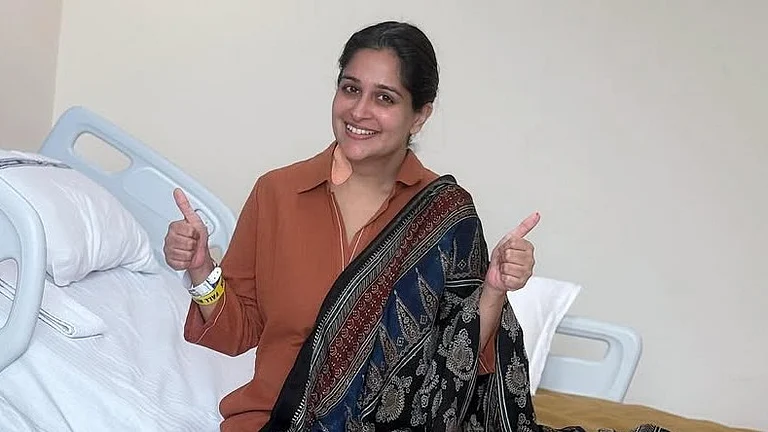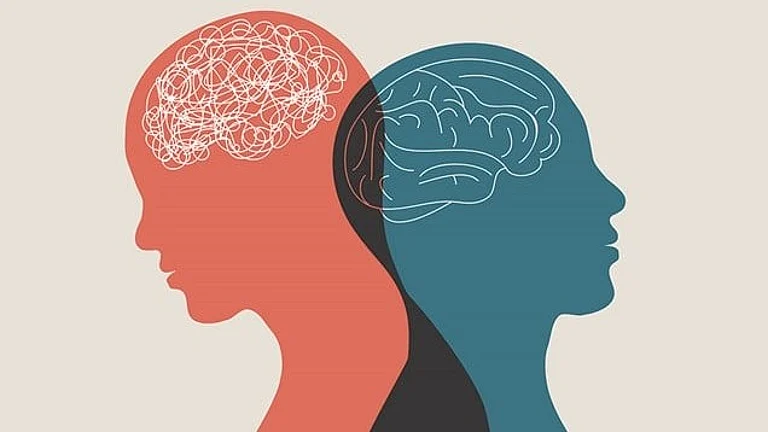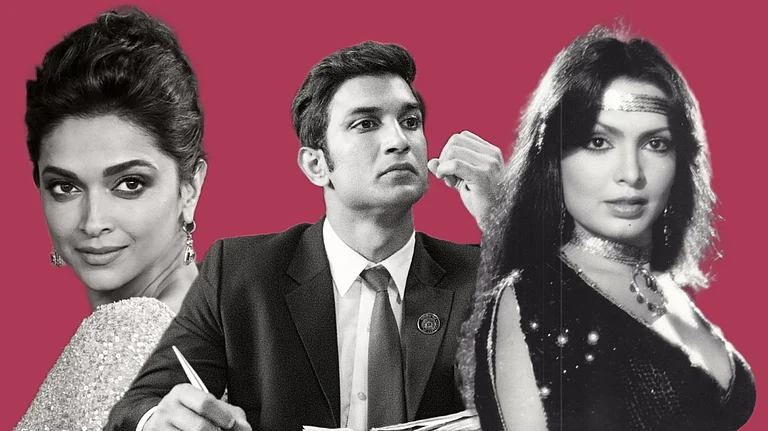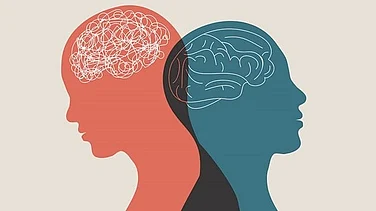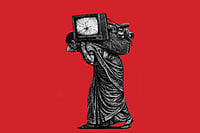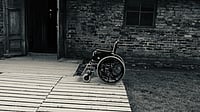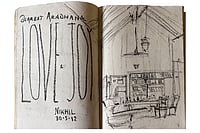An ode to a grandfather who was a caregiver to his schizophrenic son.
Author believes that this is her trying to free herself of the burden of guilt and to assert the right to tell her story.
She says, "Finally, I feel free and light."
“Ah, love, let us be true
To one another! for the world, which seems
To lie before us like a land of dreams,
So various, so beautiful, so new,
Hath really neither joy, nor love, nor light,
Nor certitude, nor peace, nor help for pain;
And we are here as on a darkling plain
Swept with confused alarms of struggle and flight,
Where ignorant armies clash by night,”
—From Dover Beach by Matthew Arnold, which you read out to me often and now, I know why.
Dear Nana,
It is your birthday on August 15.
It is also India’s Independence Day.
On August 15, 1988, you wrote in your diary, “my birthdate and verily, the birthdate of a free India.” You would have been 116 years old this Independence Day.
I know you are free at last. Of guilt and shame, of the sad fate of an old man who worried about the future of his son; of the burden of care which grew heavier by the day for your frail frame.
You were the first person I wrote a letter to. You told my mother, your daughter, when I stole books from your library, that she shouldn’t punish me for stealing books.
Your granddaughter, the book thief, also stole three of your diaries. I know you were sad and beaten, that on winter nights, you felt despair. You didn’t know how to reconcile with the fact your youngest son, a doctor, had become “mad” and how to carry on. You had your pension but it wasn’t a lot of money. Not in your circumstances.
I was there under the bed hiding when your son had that manic episode that changed everything. Nobody recovered from it. Not him. Not you. Not the others.
It was almost 30 years ago.
That afternoon, Uncle had a stick in his hand. He wandered up and down the corridor and hit his sister on the head. I watched it all. She was cupping her head in her hands. The blood is still very red in my memory.
I remember Grandmother had slipped and had hurt herself and you watched all of it helplessly. Uncle wouldn’t listen to anyone except the voices in his head in those moments. Voices that controlled him, voices that were louder than the sound of all the waves of the sea crashing at the shore.
Later, when he had returned to his room, I had gone to the hospital with Masi and Mummy. Masi got stitches. Your other sons came and took their mother for treatment in their city. You stayed back. You couldn’t leave your son behind. You, who had a bent back, had to be strong. Who were you when you were alone in your room with your books and your thick magnifying glasses and all the loneliness that you contained?
Soon after, your son had to be taken to the state mental hospital in Ranchi again. They called it ‘Kanke’. He was there for a month. They would send him back when he would recover. But it would start again.
I know now that he had schizophrenia. I called my mother today to ask for more. Something happened to him in college. It was before I was born. He was then living with you in Patna and he started breaking things, which is when you realised something had gone wrong. You sent him to Banaras for treatment. You worried about the stigma. My mother was still unmarried. You wanted to find her a match before word got around.
You would give him his medicines, look out for him. You didn’t know who to turn to. People had their lives. You wrote in your diary that only God knew the truth. Nani sold her jewellery within the family to raise money for the treatment. I remember it all. Things that would want me to forget, but you asked me to study literature. Poetry demands that we remember. It demands that we must not be afraid to confront anything. This is me trying to free myself of the burden of guilt and to assert my right to tell my story. Your story is mine too.
You wouldn’t ask for help from anyone. My mother still has that necklace that she bought. She kept it for me.
When Nani died in another city in 1996, you remained in that house with its peeling green paint, listening to the radio as you had always done. You couldn’t meet her. You were too weak, too defeated to go.
You died a few years later. Alone. In 2000.
They said you passed away quietly in your sleep.
I wouldn’t say you went in peace.
I remember the house with the peeling green paint in Arrah. I even went there a few years ago on a whim. I remembered the cinema hall down the road. And when I got there, the house was no longer there. Only a wall remained.
If you’d been alive, I’d have told you that there is a place that Uncle could have lived in. It is The Banyan.
You’d not be so worried then.
But you are gone. And he is gone. He died in 2005. Peacefully, they say. He was only 50.
I am still here looking for a happy ending for you, for me, for everyone.
I still see that little window in your room half open, the mosquito net lifting slightly, you lying with your back towards us. I inherited the coat hanger and your childhood bed. I sleep in it. It is a queen-sized bed. Enough for one person and their loneliness.
Your other granddaughter, who lived with you because your eldest daughter had returned to you after her husband died within a few years of her marriage, passed away not so long after you were gone. She had a hole in her heart. You didn’t have the money to fix everything. She had wanted to live. She was too young to die, but not all stories have happy endings. Your daughter sat next to her daughter’s dead body in the corridor. She didn’t cry. She sat there quietly looking at her daughter’s face.
They decided to close the house after the deaths. Your daughter went to live with her elder daughter. Your son went to live with your eldest son.
I have since your death returned to those poems you read out to me often. I became a journalist. They say poetry is not journalism, but I know you’d laugh at that atrocious proposition.
I can’t edit life or death or sorrow or pain.
You knew there was no way out except to live with it. I have learnt the same.
If you had been around, I’d have read out the stories to you in this magazine just like you would read out Matthew Arnold’s Dover Beach to me. I know you couldn’t see very well towards the end.
I was introduced to Vandana Gopikumar of The Banyan by someone who I once knew. She said I could visit their centres and meet people who live with mental illnesses. It wasn’t easy. We weren’t prepared for the brutality and violence in those stories. But the women and men told it all. Without restraint, without shame. We cried a lot in our hotel rooms at the end of each day we spent in a facility or a home.
I want you to know you weren’t alone, although it must have felt like that back then. I guess this is what makes us feel alive. All the pain and the promise of redemption.
What I am leaving on the page here is not a sad story. It is an honest one. That’s a liberating thought.
Finally, I feel free and light.
I know if I slip, I have a place to go to where I will find friends.
Angela (name changed) was outside the room where I had been put on intravenous drips that day at the Mogappair facility. Maybe I had too much sadness in my body.
She started to sing. That old song by John Denver called ‘Country Roads, Take Me Home’.
Drivin’ down the road, I get a feelin’
That I should’ve been home yesterday, yesterday...
I wanted to give up. The slippage could happen. But then I remembered home because she told me to go home. And home is you and everything else that I can return to.
Here’s this issue then. In memory of you and Uncle. For freedom’s sake. And for our sake.
Chinki Sinha is editor, Outlook Magazine.
In its August 21 issue 'Everyday I Pray For Love' Outlook collaborated with The Banyan India to take a hard look at the community and care provided to those with mental health disorders in India. From the inmates in mental health facilities across India—Ranchi to Lucknow—to the mental health impact of conflict journalism, to the chronic stress caused by the caste system, our reporters and columnists shed light on and questioned the stigma weighing down the vulnerable communities where mental health disorders are prevalent. This copy appeared in print as 'The Harsh Beauty Of Pain.'








